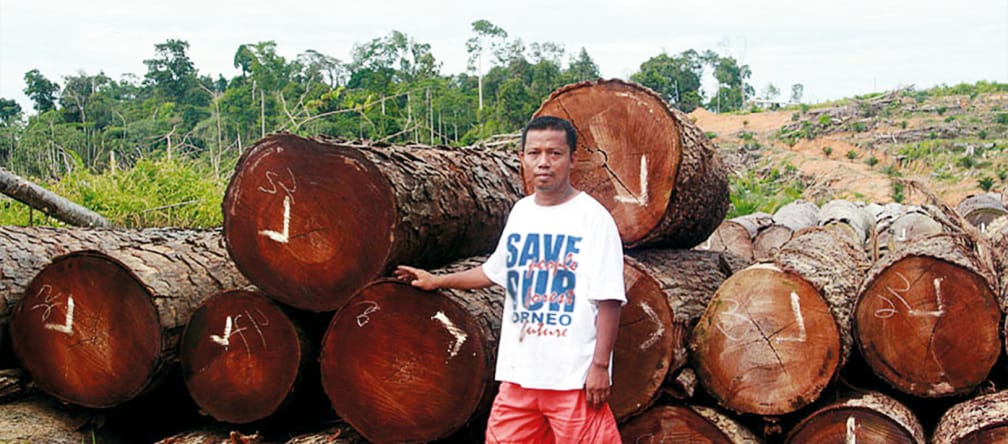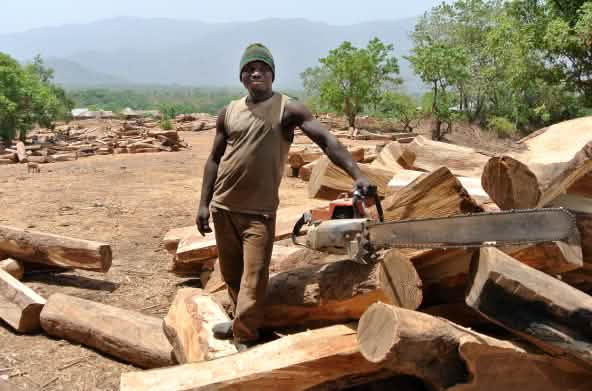
Completed campaign
Please help to stop the palm oil Mafia!
One thousand people on the Indonesian island of Borneo have lost their forest. It was cleared illegally by the corporate group IOI and its partners who supply food giants Nestlé and Unilever with palm oil. Our partner Nordin has collected plenty of evidence against the criminals. Please support Nordins demand for boycott of IOIs palm oil
"The conversion of forest into palm oil plantations is shattering our country", says Nordin. He is head of our partner organisation Save Our Borneo (SOB) that fights the palm oil industry's illegal activities. "I want to conserve Borneo's rainforests for us and our children", the 42-year-old explains.
Nordin has already achieved a number of important successes: In 2011 the police started to investigate against ten illegally clearing palm oil companies due to the data he collected. Moreover, the constitutional court decided that thousands of hectares of palm oil plantations violate the constitution, as natives and peasants were cast out to make way for them.
7,000 hectares illegally cleared for chocolate and traffic fuel
On March 23rd 2012 the residents of the village Tumbang Kalang in the province of Central Kalimantan call Nordins attention to a huge environmental crime. 7,000 hectares of dense virgin forest have been cut down, profitable oil palms have been planted on half of this area. One thousand people have lost their forest with its natural rubber and fruit trees. The soils and waters have been contaminated.
The corporation responsible is palm oil giant IOI – a supplier for Nestlé, Unilever and traffic fuels producer Neste Oil. All three companies publicly pride themselves for their efforts in "sustainability".
In a letter from 2008 held by Nordin, the ministry of forestry revoked a former clearance licence. Now Nordin is preparing to file a case – and the wind is in his sails. The local government is now officially asking IOI to leave. However, to prevent more damage elsewhere, the palm oil Mafia's profit stream has to be cut off.
Please call on Nestlé, Unilever and Neste Oil not to buy any more palm oil from IOI.
The IOI group is a founding member of the RSPO, an association which supposedly stands for sustainable palm oil. IOI itself promised not to clear any more rainforests for oil palm plantations from 2007 onwards. However, IOI is often criticized due to land expropriation, illegal clearing and the destruction of orangutan habitats.
IOI's partner Bumitama Gunajaya Agro Group (BGA) via its subsidiary PT Hati Prima Agro is doing the dirty work of clearing the rainforest for oil palm plantations without the necessary permits, as our partner Nordin has carefully documented in reports and photographs. On April 24th, 2012 the head of district Bupati revoked PT HPA's permit.
It is a common strategy among palm oil companies to continously establish new subsidiaries or to become key stake holders in other companies in order to make it more difficult to prove their illegal activities.
To the management of Nestlé, Unilever and Neste Oil,
Dear Sirs,
the Indonesian environmental organization Save Our Borneo (SOB), partner organization of Rainforest Rescue, has discovered illegally cleared areas in the primary rainforest in Antang Kalang, Kotawaringin Timur District, Central Kalimantan. Your supplier IOI is a key stakeholder in the responsible company Bumitama Gunajaya Agro Group (BGA) via its subsidiary PT Hati Prima Agro.
The concession for this plantation was revoked by the Ministry of Forestry in the letter No. SK51/Menhut-II/2008. As SOB tells us, at least 7,000 hectares are affected. On 3,000 hectares oil palm seedlings have been planted.
IOI is a founding member of the RSPO and has committed itself not to destroy any more rain forests / HCVF (High Conservation Value Forests) for oil palm plantations. Several times in the past IOI's subsidiaries drew negative attention to themselves by destroying the environment and violating human rights. Even the RSPO is investigating against the IOI group due to unsettled land conflicts in Sarawak/Malaysia.
The illegal clearance by Bumitama Gunajaya Agro Group (BGA) not only infringes upon RSPO principles, but also offends against Indonesian law and international treaties. The subsidiaries involved neither hold national permits nor an international legitimation for their destructive procedures. In an international treaty with Norway Indonesia issued a two year moratorium on the clearance of primary rainforests in 2011.
Furthermore, your supplier IOI contravenes all sustainability and environmental criteria of your company. On your web page, in marketing and in your representatives' speeches you consistently advert to your sustainable and ecologically sensitive focus which supposedly fits into international ecological and human rights standards. Moreover you tell the public that you assume responsibility for the sustainability of your supply chain.
In reference to your mentioned self-made standards and principles I ask you to verify the accusations against IOI supplier Bumitama Gunajaya Agro Group (BGA) and to cancel your trade connections with the IOI group due to repeated transgression of national laws and international treaties.
If you continue to hold on to your supply relationship to the IOI group, you are deceiving your customers about the reality of your products.
Yours faithfully,
The issue – rainforest on our dinner tables and in our fuel tanks
At 66 million tons annually, palm oil is the most commonly produced vegetable oil. Its low world market price and properties that lend themselves to processed foods have led the food industry to use it in half of all supermarket products. Palm oil can be found in frozen pizzas, biscuits and margarine, as well as body creams, soaps, makeup, candles and detergents.
Few people realize that almost half of the palm oil imported into the EU is used as biofuel. Since 2009, the mandatory blending of biofuels into motor vehicle fuels has been a major cause of deforestation.
Oil palm plantations currently cover more than 27 million hectares of the Earth’s surface. Forests and human settlements have been destroyed and replaced by “green deserts” containing virtually no biodiversity on an area the size of New Zealand.
The impact – suffering and death in producer countries, climate havoc
The warm, humid climate of the tropics offers perfect growth conditions for oil palms. Day after day, huge tracts of rainforest in Southeast Asia, Latin America and Africa are being bulldozed or torched to make room for more plantations, releasing vast amounts of carbon into the atmosphere. As a consequence, Indonesia – the world’s largest producer of palm oil – temporarily surpassed the United States in terms of greenhouse gas emissions in 2015. With their CO2 and methane emissions, palm oil-based biofuels actually have three times the climate impact of traditional fossil fuels.
Palm oil is not only bad for the climate: As their forest habitat is cleared, endangered species such as the orangutan, Borneo elephant and Sumatran tiger are being pushed closer to extinction. Smallholders and indigenous people who have inhabited and protected the forest for generations are often brutally driven from their land. In Indonesia, more than 700 land conflicts are related to the palm oil industry. Human rights violations are everyday occurrences, even on supposedly “sustainable” and “organic” plantations.
As consumers, we are largely unaware of these broader issues, yet our daily palm oil consumption also impacts our health: refined palm oil contains large amounts of harmful fatty acid esters that are known to damage DNA and cause cancer.
The solution – a revolution on our dinner tables and in our fuel tanks
Only 70,000 orangutans still roam the forests of Southeast Asia, yet the EU’s biofuels policy is pushing them to the brink of extinction. Every new plantation on Borneo is destroying a further piece of their habitat. Stepping up the pressure on policymakers is a must if we want to save our tree-dwelling kin. Apart from that, however, there is still a lot we can do in day-to-day life.
Follow these simple tips to recognize, avoid and combat palm oil:
- Enjoy a home-cooked meal: Use your imagination: why not try almond-coconut-pear biscuits? Or pizza with potato and rosemary? A meal cooked from fresh ingredients beats processed foods containing palm oil every time. Oils such as sunflower, olive, rapeseed or flaxseed are ideal for cooking and baking.
- Read labels: As of December 2014, labeling regulations in the EU require food products to clearly indicate that they contain palm oil. However, in the case of non-food items such as cosmetics and cleaning products, a wide range of chemical names may still be used to hide the use of palm oil. A quick check of your favorite search engine will turn up palm oil-free alternatives, however.
- Remember that the customer is king: Ask your retailers for palm oil-free products. Write product manufacturers and ask them why they aren’t using domestic oils. Companies can be quite sensitive to issues that give their products a bad name, so inquiring with sales staff and contacting manufacturers can make a real difference. Public pressure and increased awareness of the problem have already prompted some producers to stop using palm oil.
- Sign petitions and write your elected representatives: Online campaigns put pressure on policymakers responsible for biofuels and palm oil imports. Have you already signed all of Rainforest Rescue’s petitions?
- Speak out: Protest marches and creative action on the street raise public and media awareness of the issue, which in turn steps up the pressure on policymakers.
- Leave your car at home: Whenever you can, walk, ride a bicycle or use public transport.
- Be informed and inform others: Big Business and governments would like us to believe that biofuels are good for the climate and that oil palm plantations are sustainable. Spread the word – share this information with your family and friends and encourage them to rethink their consumption habits. It’s in our hands!

